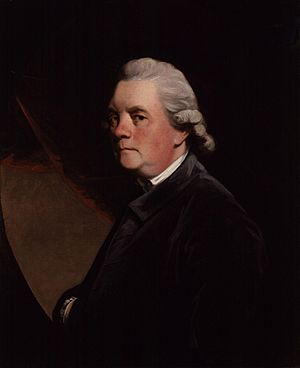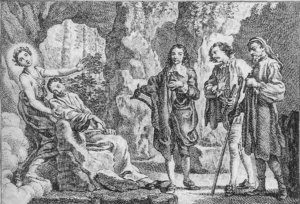William Mason (poet) facts for kids
Quick facts for kids
William Mason
|
|
|---|---|

William Mason by William Doughty
(oil on canvas, 1778) |
|
| Born | 12 February 1724 Kingston upon Hull, East Riding of Yorkshire, England
|
| Died | 7 April 1797 (aged 73) Aston, East Riding of Yorkshire, England
|
| Occupation | English poet, editor and gardener |

William Mason (born February 12, 1724 – died April 7, 1797) was an English poet, church leader, artist, writer, and gardener. He was known for his poems, plays, and his ideas about garden design.
Contents
William Mason's Life and Work
William Mason was born in Hull, England. He went to Hull Grammar School and then studied at St John's College, Cambridge. In 1754, he became a priest in the Church of England. He held several important jobs in the church throughout his life.
Early Poems and Plays
In 1747, Mason published a poem called "Musaeus." It was a special poem written to honor the death of another famous poet, Alexander Pope. This poem was very popular and was printed many times.
Mason also wrote plays, which were called tragedies. These included Elfrida (1752) and Caractacus (1759). These plays were even turned into operas in other languages. He also wrote a long poem about gardening called The English Garden, which came out in three parts between 1772 and 1782. He even designed gardens for important people, like Viscount Harcourt.
Church and Friendships
In 1762, William Mason became a leader at York Minster, a very large and famous church. He was known as the precentor and a canon there.
Mason was a close friend of the famous poet Thomas Gray. He was also Gray's biographer, meaning he wrote about Gray's life. In 1775, Mason published a book of Gray's poems that included details about Gray's life and writings. Mason was also friends with other well-known people like Horace Walpole and the painter Joshua Reynolds.
Art and Recognition
William Mason was not just a writer; he was also an artist. His artwork was good enough to be shown at the Royal Academy in London from 1782 to 1786.
In 1785, the Prime Minister, William Pitt the Younger, wanted Mason to become the Poet Laureate. This is an official poet for the King or Queen of England. However, Mason chose to turn down this important honor.
Two of his artworks showed scenes from the York racecourse. These pictures were later made into special prints by other artists in 1786.
Remembering William Mason
You can find memorials for William Mason in the church at Aston, where he was a rector (a type of priest). There is also a memorial for him in Poet's Corner at Westminster Abbey, a special place where many famous writers are remembered.
Images for kids
See also
 | William L. Dawson |
 | W. E. B. Du Bois |
 | Harry Belafonte |






